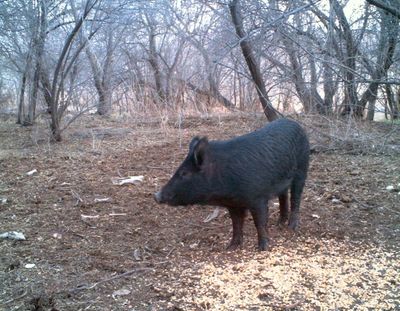Campaign urges reporting of feral pig sightings

BOISE - Idaho, Oregon and Washington have jointly launched a “Squeal on Pigs” campaign to combat the latest invasive species - feral swine - that’s turned up in all three states.
Originating in Europe and Asia and imported for domestic use, the wild pigs, also known as the Russian boar, can grow to several hundred pounds and cause extensive damage to crops, wildlife and habitat; the three states’ invasive species councils want folks to be on the lookout for the swine in the wild and report them if seen.
It’s not just their destructive rooting and grubbing. Feral swine, defined as any pig that is not confined within a fenced property, often carry diseases that may be transmitted to livestock or humans; they prey on lambs, calves, fawns, upland birds and other wildlife; and they’re remarkably fertile, producing a couple of litters of four to eight piglets a year and traveling long distances to invade new watersheds.
“They establish in new areas fairly easily,” said Lisa DeBruyckere, Oregon’s invasive species council coordinator. Oregon estimates it has between 3,000 and 5,000 of the wild pigs, mostly in the central and southwestern parts of the state.
Feral swine caused $52 million worth of damage in Texas, a heavily infested state, last year; the three Pacific Northwest states say they don’t want their region to follow suit.
“Eradicating this species before it becomes established in the Pacific Northwest will prevent the transmission of disease and environmental damage,” said Dr. Bill Barton, Idaho state veterinarian.
Idaho identified a population of about 100 feral pigs in the Bruneau River area in Owyhee County 2009 that’s since been successfully eradicated through trapping and hunting. “They didn’t find any this year,” said Amy Ferriter, Idaho’s invasive species council coordinator.
Ferriter said the swine are not native to North America. “But they are transported around by people,” she said. “They can be escaped, or they can be introduced for hunting purposes.”
She added, “They can get very large. In Texas and Florida, they grow to several hundred pounds.”
In Washington, sightings of feral swine have been reported in the southwestern part of the state, and a pig population boom on the Olympic Peninsula in 2001 was targeted through hunting; the Quinault Indian Nation had long hunted wild swine in the area.
Ferriter said, “They like riparian areas, anything that has a little bit of water that they can actually wallow in, and food sources.”
In addition to its identified populations, Oregon has received scattered reports of individual sightings of the wild swine. That’s what all three states are hoping for - to identify them in the wild and eradicate them before they take hold.
“We don’t know who brought ‘em in or how they came,” Ferriter said. “That’s really why we’re trying to get the word out. If people see these things in the wild, they should report them to us.”
The “Squeal on Pigs” campaign includes a toll-free hotline number to call: (888) 268-9219.
The campaign’s full slogan is: “Squeal on Pigs! Protect our Water and Land from Feral Pigs.”